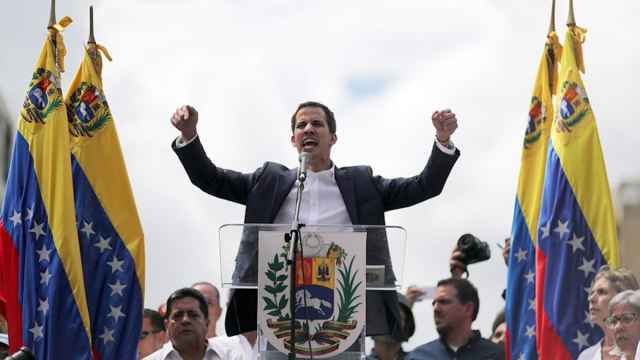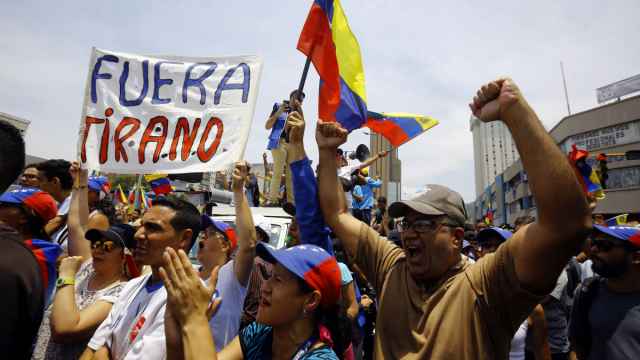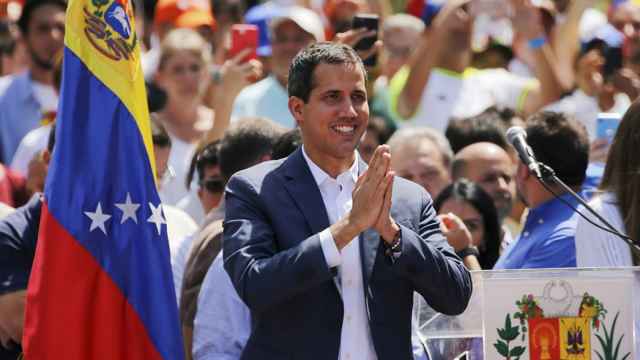Russia’s Foreign Minister Sergei Lavrov and U.S. Secretary of State Mike Pompeo are heading towards a contentious meeting in Finland (their first since the Helsinki summit last year) with the crisis in Venezuela crowding out almost all other items on the agenda.
Last week, Russia and Cuba may have thwarted a U.S. backed plot to engineer a peaceful transfer of power from Nicolas Maduro to a transitional government led by interim president Juan Guaido and Venezuela’s top officials, including Defense Minister Vladimir Padrino and Supreme Court Chief Justice Maikel Moreno.
Secretary Pompeo accused Moscow of dissuading Maduro from leaving the country (allegedly he was assured of safe passage to Guatemala) when his plane was already on the tarmac. Moscow furiously denied the charges when Pompeo phoned Lavrov on May 1 to protest.
On May 3, U.S. President Donald Trump called Russia’s President Vladimir Putin to flag American concerns over Russia’s "disruptive role” in Venezuela and stress his country’s determination to ensure Venezuela’s return to democratic rule.
But, as common in his personal interactions with Putin, Trump quickly lost the initiative, allowing the discussion on Venezuela to drift towards the softer subject of humanitarian aid.
Putin expressed Russia’s displeasure with U.S interference in Venezuela while convincing Trump that he “was not looking at all to get involved in Venezuela”.
Despite Trump’s going “full Helsinki” on his phone chat with Putin, the U.S.-Russia geopolitical stand-off in Venezuela now threatens to derail the few remaining cooperative lanes in the relationship. White House national security advisor John Bolton made it clear on May 1: “This is our hemisphere — it’s not where the Russians ought to be interfering”.
Three weeks ago, the same point, in even more forceful terms, was privately made by Fiona Hill, NSC Senior Director for Europe, Russia and Eurasia during her visit to Moscow.
The Kremlin was struck by Hill’s prioritization of Venezuela as the most important issue in the relationship due to its direct impact on U.S. politics and the 2020 presidential race in Florida. Moscow concluded then it found an issue it could use to force the U.S. to grant concession elsewhere, most notably in Ukraine.
Russia believes that the risk of a U.S. military intervention in Venezuela is low (despite secret meetings at the Pentagon), since Trump does not want to get stuck in another unpopular war. But politically Trump is so heavily invested in a “win” in Venezuela that he has all but drawn himself an untenable red line with prospects of a major loss of face, while his strategy there is just “winging it”. Moscow may be undervaluing Trump’s ability to turn on a dime, but still thinks it finally has leverage.
Russia’s support for Maduro is driven by financial and energy interests, as well as by the Kremlin’s vision of a multi-polar world order, where Russia should block U.S. attempts at regime change in sovereign states friendly to Moscow. But the Russian leadership practices a transactional approach to international affairs in line with Russia’s hierarchy, where core Russian interests trump goals of less importance.
Bolton’s invocation of the Monroe Doctrine and his “spheres of influence framing” makes Moscow believe that, if done on an equal basis, a similar right should be recognized for Russia in Ukraine and other parts of the "near abroad”.
For Moscow, a deal of equals on Venezuela where Russia helps the U.S. diffuse the crisis by engineering a constitutional transition, should involve an equally significant concession by the U.S. (on a par with JFK-Khrushchev deal to remove nuclear missiles from Cuba and Turkey) to pressure Kiev into fully implementing the Minsk-2 agreements that would truncate Ukraine’s sovereignty and allow Moscow to retain some degree of control over Kiev’s security policies.
Putin specifically mentioned that during his call with Trump. Withdrawing Russian military support for Maduro should also be matched by the withdrawal of U.S. military assistance to Ukraine.
So far Moscow has been frustrated by American refusal to engage in such bargaining of equals through the U.S. initiated bilateral high-level channel of communication on Venezuela (which Moscow assumed it was intended for). The first meeting between Deputy Foreign Minister Ryabkov and U.S. Special Envoy for Venezuela Elliot Abrams in mid-March ended in the U.S. presenting no bargains and simply repeating its demands Russia ends its support for Maduro.
Sending two Russian military planes to Caracas days after the meeting in Rome was Moscow signaling its position if America wasn't ready to take them seriously going forward.
Trust between Moscow and Washington is currently non-existent. No side could be sure that even if a deal was reached, the other side would implement its end of the bargain. The meeting between Lavrov and Pompeo may prove to be as bitter as the one held by Hill if neither side signals their willingness to negotiate. Or it might be the wrong format altogether, actual deals might require a secret channel or a one-on-one presidential sit-down.
Moscow, however, knows that the events of last week do not augur well for Maduro’s long-term rule. The Venezuelan military is sitting on the fence and its leaders are mulling their options.
The deal offered to them by the opposition (not just amnesty, but a retention of their power in the transitional government) is more serious than anything discussed before. Moscow does not have control over Venezuela’s military the way it had in Syria, where pro-Assad officers knew they and their families would be slaughtered if they lost the war. Nor are there foreign expeditionary forces of non-Russian provenance supplied and funded by an allied power (Iran) to do the heaviest fighting.
Moscow is ready to sell its stake in Maduro, but it is still unclear whether Washington is ready to offer the right price.
A Message from The Moscow Times:
Dear readers,
We are facing unprecedented challenges. Russia's Prosecutor General's Office has designated The Moscow Times as an "undesirable" organization, criminalizing our work and putting our staff at risk of prosecution. This follows our earlier unjust labeling as a "foreign agent."
These actions are direct attempts to silence independent journalism in Russia. The authorities claim our work "discredits the decisions of the Russian leadership." We see things differently: we strive to provide accurate, unbiased reporting on Russia.
We, the journalists of The Moscow Times, refuse to be silenced. But to continue our work, we need your help.
Your support, no matter how small, makes a world of difference. If you can, please support us monthly starting from just $2. It's quick to set up, and every contribution makes a significant impact.
By supporting The Moscow Times, you're defending open, independent journalism in the face of repression. Thank you for standing with us.
Remind me later.








